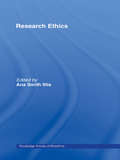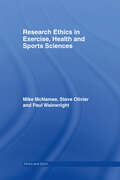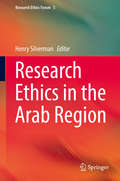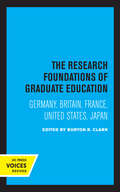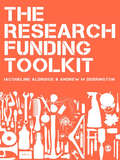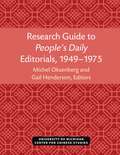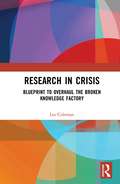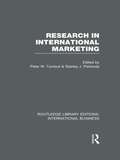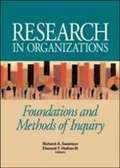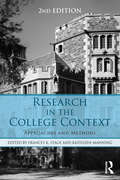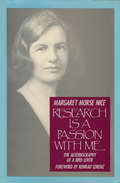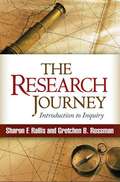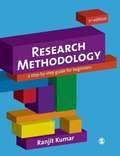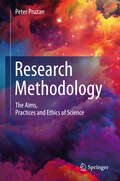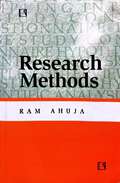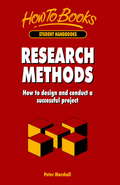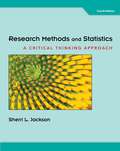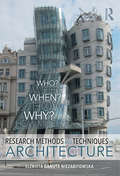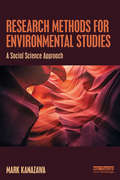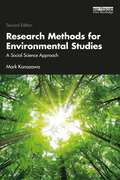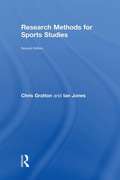- Table View
- List View
Research Ethics (Routledge Annals of Bioethics #Vol. 1)
by Ana Smith IltisMedicine in the twenty-first century is increasingly reliant on research to guarantee the safety and efficacy of medical interventions. As a result, the need to understand the ethical issues that research generates is becoming essential. This volume introduces the principal areas of concern in research on human subjects, offering a framework for understanding research ethics, and the relationship between ethics and compliance. Research Ethics brings together leading scholars in bioethics and the topics covered include the unique concerns that arise in specific areas of research such as gene therapy and stem cell research. Individual chapters also address the ethical issues that occur when conducting research with specific populations such as infants or adolescents, and the volume looks at important emerging questions in human subjects research, namely financial conflicts of interest and the interpretation of scientific data.
Research Ethics in Exercise, Health and Sports Sciences (Ethics and Sport)
by Paul Wainwright Stephen Olivier Mike J. McNameeResearch Ethics in Exercise, Health and Sports Sciences puts ethics at the centre of research in these rapidly expanding fields of knowledge. Placing the issues in historical context, and using informative case studies, the authors examine how moral theory can guide research design, education, and governance. As well as theoretical analysis, key practical concerns are critically discussed, including: informed consent anonymity, confidentiality and privacy plagiarism, misappropriation of authorship, research fraud and ‘whistleblowing’ ethics in qualitative research vulnerable populations trans-cultural research. Providing an accessible and robust theoretical framework for ethical practice, this book challenges students, researchers and supervisors to adopt a more informed and proactive approach to ethics in exercise, health and sports research. This insightful text will be of great interest to those taking a kinesiology, human movement, sport science or sport studies degree course.
Research Ethics in the Arab Region
by Henry SilvermanThis book addresses the pressing issues involved with the ethical conduct of research in one developing world region - the Arab Region. Clinical research has soared in the developing world -as pharmaceutical companies continue their search for regions with large, treatment naive populations - including the Arab region, and has profound implications for the health and the economies for the area. The ethical issues involved with the conduct of such research, however, have so far not been adequately addressed. This volume presents the issues regarding research ethics and research governance that have relevance for health authorities, regulators, industry, and academia. As a multi-authored volume it includes both international and local experts on ethical issues in research, representing all stakeholders, thus presenting a balanced view on this timely topic.
The Research Foundations of Graduate Education: Germany, Britain, France, United States, Japan
by Burton R. ClarkThis title is part of UC Press's Voices Revived program, which commemorates University of California Press’s mission to seek out and cultivate the brightest minds and give them voice, reach, and impact. Drawing on a backlist dating to 1893, Voices Revived makes high-quality, peer-reviewed scholarship accessible once again using print-on-demand technology. This title was originally published in 1993.
The Research Funding Toolkit: How to Plan and Write Successful Grant Applications
by Jacqueline Aldridge Andrew M. DerringtonWriting high quality grant applications is easier when you know how research funding agencies work and how your proposal is treated in the decision-making process. The Research Funding Toolkit provides this knowledge and teaches you the necessary skills to write high quality grant applications. A complex set of factors determine whether research projects win grants. This handbook helps you understand these factors and then face and overcome your personal barriers to research grant success. The guidance also extends to real-world challenges of grant-writing, such as obtaining the right feedback, dealing effectively with your employer and partner institutions, and making multiple applications efficiently. There are many sources that will tell you what a fundable research grant application looks like. Very few help you learn the skills you need to write one. The Toolkit fills this gap with detailed advice on creating and testing applications that are readable, understandable and convincing.
Research Guide to People’s Daily Editorials, 1949–1975
by Michel Oksenberg Gail HendersonAn indispensable aid to researching a crucial series of policy statements, the present guide provides access to the only continuous source from China which illuminates high-level policy. Includes an extensive subject index.
Research in Crisis: Blueprint to Overhaul the Broken Knowledge Factory
by Les ColemanThis book explores the weak explanatory and predictive power of theories across disciplines, explains reasons for limited expertise after centuries of scientific effort, and sets forth strategies to accelerate knowledge and manage a future we can only dimly comprehend. Gaps in knowledge arose because common, natural and artificial phenomena are fundamentally hard to understand, and in expertise persists because research is unproductive. This book argues that weak research comes with huge opportunity cost because it stymies optimum decision making by government, corporations and individuals. Research needs restructuring which must come from governments’ top down requirement that funding bodies foster applied research with real-world impact, and that universities influence scientific publishers to improve their publications’ integrity. This book seeks to catalyse extinction events for theories in most disciplines, which would clear a path for solving multiple crises in research. The author cautions that this process would be disruptive, unpopular and painful.
Research in International Marketing (Routledge Library Editions: International Business)
by Peterw. Turnbull Stanley J. PaliwodaThis book considers problems which can be serious obstacles in international marketing but which are much less difficult in domestic marketing, such as cultural differences; the establishing and maintaining of relationships with customers’ and the special problems for firm strategy and organisation arising from the internationalisation process.
Research in Organizations: Foundation and Methods of Inquiry
by Richard A. Swanson Elwood F. Holton IIIResearch in Organizations offers a holistic perspective of the subject that embraces quantitative, qualitative, and mixed-methodology research procedures.
Research in the College Context: Approaches and Methods
by Kathleen Manning Frances K. StageResearch in the College Context, 2nd Edition provides faculty, students, practitioners, and researchers in the college environment with a manual of diverse approaches and methods for researching higher education and college students. The text offers the reader a variety of qualitative and quantitative research tools including interviewing, surveys, mixed methods, focus groups, visual methods, participatory action research, policy analysis, document analysis and historical methods, secondary data analysis, and use of large national data sets. This revised edition provides readers with current and innovative methodological tools needed to research the complex issues facing higher education today. Each technique is thoroughly presented with accompanying examples, advice for designing research projects, and tips for data collection, analysis, and dissemination of results. Clearly organized and accessible, this volume is the essential guide for experienced and novice researchers.
Research Is a Passion With Me: The Autobiography of a Bird Lover
by Margaret Morse Nice Konrad LorenzIn her incredibly productive lifetime (1883-1974), American-born ornithologist Margaret Morse Nice earned the admiration of ornithologists and naturalists in far distant lands. Research Is a Passion With Me is an enthralling autobiography of one of the great individuals in her field and of her time. The prominent California nature writer, Donald Peattie, in commenting on Margaret Nice’s writing ability, stated: "Your art of telling is so good that it conceals how good the science is." And Professor Ernst Mayer of Harvard University said: "Margaret Nice was a remarkable person and only those who know the state of American ornithology when she started her work will appreciate her contribution." "An extraordinary bird watcher. Every summer she and her husband would gather the girls, pack their old car with camping gear, and head off into the wilds to look for new birds. This eccentric way of living was unusual in the early 1920s, but even their youngest daughter adjusted to it. Their older girls shinnied up trees to observe nests and helped in housekeeping tasks around the campsite."- Marcia Bonta, Bird Watcher’s Digest
The Research Journey: Introduction to Inquiry
by Sharon Rallis Gretchen Rossman Thomas SchwandtDesigned to foster "inquiry-mindedness," this book prepares graduate students to develop a conceptual framework and conduct inquiry projects that are linked to ongoing conversations in a field. The authors examine different ways of knowing and show how to identify a research question; build arguments and support them with evidence; make informed design decisions; engage in reflective, ethical practices; and produce a written proposal or report. Each chapter opens with a set of critical questions, followed by a dialogue among five fictional graduate students exploring questions and concerns about their own inquiry projects; these issues are revisited throughout the chapter. Other useful features include end-of-chapter learning activities for individual or group use. Useful pedagogical features include: *Framing questions for exploration and reflection. *Chapter-opening dialogues that bring in perspectives from multiple disciplines. *Example boxes with detailed cases and questions for the reader. *End-of-chapter activities and experiential exercises that guide readers to develop their own inquiry projects. *Suggestions for further reading.
Research Methodology: A Step-By-Step Guide for Beginners (3rd Edition)
by Ranjit KumarThe Third Edition of Research Methodology: A Step-by-Step Guide for Beginners integrates various quantitative and qualitative methodologies into eight practice-based-steps, providing lots of examples throughout to link theory with practice. Written specifically for students with no previous experience of research and research methodology, the writing style is simple and clear and the author presents this complex subject in a straightforward way that empowers readers to tackle research with confidence. The book has been revised and updated to include extended coverage of qualitative research methods in addition to existing comprehensive coverage of quantitative methods. There are also brand new learning features such as reflective questions throughout the text to help students consolidate their knowledge.
Research Methodology: The Aims, Practices And Ethics Of Science
by Peter PruzanThisbook is an in-depth guide to effective scientific research. Ranging from thephilosophical to the practical, it explains at the outset what science can -and can't - achieve, and discusses its relationship to mathematics and laws. Theauthor then pays extensive attention to the scientific method, including experimentaldesign, verification, uncertainty and statistics. A major aim of the book is tohelp young scientists reflect upon the deeper aims of their work and make the best use of theirtalents in contributing to progress. To this end, it also includes sections onplanning research, on presenting one's findings in writing, as well as onethics and the responsibilities of scientists.
Research Methods
by Ram AhujaTailored for students and researchers in the social sciences and business administration, this book seamlessly merges the author's firsthand observations from years of research with insights gleaned from existing literature. Its dual purpose is to introduce students to foundational and theoretical concepts in social research while offering practical guidance to researchers navigating the intricacies of conducting their own studies. By combining personal expertise with scholarly discourse, it serves as a comprehensive resource for both novice learners and seasoned professionals in the field.
Research Methods: How to Design and Conduct a Successful Project
by Dr. Peter MarshallAll social science courses offered at universities include a research methods module. This book explains the various methods available to social researchers, and the basic principles, strengths and weaknesses involved in the use of both qualitative and quantitative methods.
Research Methods: How To Design And Conduct A Successful Project (Student Handbks.)
by Peter MarshallAll social science courses offered at universities include a research methods module. This book explains the various methods available to social researchers, and the basic principles, strengths and weaknesses involved in the use of both qualitative and quantitative methods.
Research Methods: Concepts and Connections
by Michael PasserAt last, a fresh approach to the research methods course. With 20+ years experience teaching the course, Michael Passer knows what students understand and where they struggle. His highly anticipated new book, Research Methods: Concepts and Connections, offers students clear and compelling explanations and examples drawn from cutting-edge research from across the subfields of psychology. Readers come away with an unparalleled understanding of behavioral research practice in today’s world and how those skills apply to everyday life.
Research Methods and Statistics: A Critical Thinking Approach,Fourth Edition
by Sherri L. JacksonRESEARCH METHODS AND STATISTICS: A CRITICAL THINKING APPROACH, 4e, successfully illustrates the integration between statistics and research methods by demonstrating the ways to use statistics in analyzing data collected during research. Jackson's combined text adopts an inviting narrative style that draws you into the material, helping you overcome the initial apprehension you may feel at having to learn both subject areas at once. She incorporates a student-friendly critical-thinking approach and presents examples and exercises to which you can relate. Jackson focuses on the logic of the process and the methodology aspect of research.
Research Methods and Techniques in Architecture
by Elzbieta Danuta NiezabitowskaA scientific approach to architectural and architectonic research from the scope of just one discipline is no longer sufficient. With contemporary considerations such as behavior, health, and environmental protection, architects and students alike need holistic research methodologies that incorporate qualitative elements as well as more traditional quantitative ones. <P><P>Research Methods and Techniques in Architecture examines research methodologies and tools applied in science and architectonic practice. Beginning with a thorough introduction to the main scientific, environmental, and architectural theories of the late twentieth century, the book guides the reader through the different aspects of architectural research design, building research teams, choosing applicable research methods, and representing research results.
Research Methods for Environmental Studies: A Social Science Approach
by Mark KanazawaThe methodological needs of environmental studies are unique in the breadth of research questions that can be posed, calling for a textbook that covers a broad swath of approaches to conducting research with potentially many different kinds of evidence. Written specifically for social science-based research into the environment, this book covers the best-practice research methods most commonly used to study the environment and its connections to societal and economic activities and objectives. Over five key parts, Kanazawa introduces quantitative and qualitative approaches, mixed methods, and the special requirements of interdisciplinary research, emphasizing that methodological practice should be tailored to the specific needs of the project. Within these parts, detailed coverage is provided on key topics including the identification of a research project; spatial analysis; ethnography approaches; interview technique; and ethical issues in environmental research. Drawing on a variety of extended examples to encourage problem-based learning and fully addressing the challenges associated with interdisciplinary investigation, this book will be an essential resource for students embarking on courses exploring research methods in environmental studies.
Research Methods for Environmental Studies: A Social Science Approach
by Mark KanazawaThe methodological needs of environmental studies are unique in the breadth of research questions that can be posed, calling for a textbook that covers a broad swath of approaches to conducting research with potentially many different kinds of evidence. Fully updated to address new developments such as the effects of the internet, recent trends in the use of computers, remote sensing, and large data sets, this new edition of Research Methods for Environmental Studies is written specifically for social science-based research into the environment. This revised edition contains new chapters on coding, focus groups, and an extended treatment of hypothesis testing. The textbook covers the best-practice research methods most used to study the environment and its connections to societal and economic activities and objectives. Over five key parts, Kanazawa introduces quantitative and qualitative approaches, mixed methods, and the special requirements of interdisciplinary research, emphasizing that methodological practice should be tailored to the specific needs of the project. Within these parts, detailed coverage is provided on key topics including the identification of a research project, hypothesis testing, spatial analysis, the case study method, ethnographic approaches, discourse analysis, mixed methods, survey and interview techniques, focus groups, and ethical issues in environmental research. Drawing on a variety of extended and updated examples to encourage problem-based learning and fully addressing the challenges associated with interdisciplinary investigation, this book will be an essential resource for students embarking on courses exploring research methods in environmental studies.
Research Methods for Science
by Michael P. MarderA unique introduction to the design, analysis, and presentation of scientific projects, this is an essential textbook for students in science and mathematics. The textbook gives an overview of the main methods used in scientific research, including hypothesis testing, the measurement of functional relationships, and observational research. It describes important features of experimental design, such as the control of errors, instrument calibration, data analysis, laboratory safety, and the treatment of human subjects. Important concepts in statistics are discussed, focusing on standard error, the meaning of p values, and use of elementary statistical tests. The textbook introduces some of the main ideas in mathematical modeling, including order-of-magnitude analysis, function fitting, Fourier transforms, recursion relations, and difference approximations to differential equations. It also provides guidelines on accessing scientific literature, and preparing scientific papers and presentations.
Research Methods For Social Workers: An Introduction
by Richard M. Grinnell Margaret Williams Yvonne A. UnrauNow in its 11th edition, this popular introductory text continues to provide beginning social work students with a straightforward realistic approach to understanding how research findings are generated and utilized within the social work profession. Couched within the positivistic and interpretive traditions, the text's "student friendly" step-by-step coverage is the result of decades of the authors' research experiences, and includes all stages of the research process from selecting an initial research topic to the dissemination of the study's findings.
Research Methods for Sports Studies (2nd edition)
by Chris Gratton Ian JonesThis comprehensive, accessible and practical textbook provides a complete grounding in both qualitative and quantitative research methods for the sports studies student. The book offers the reader a step-by-step guide to the research process, from designing a research project, to collecting and analyzing data, to reporting the research, and is richly illustrated throughout with sport-related case-studies and examples from around the world. Now in a fully revised and updated new edition, the book covers key topics such as: choosing an appropriate research design undertaking a literature review key research techniques, including questionnaires, interviews, content analysis and ethnographic studies data analysis, including an introduction to SPSS, as well as guides to descriptive and inferential statistics writing a research report ethical issues in sports research. Research Methods in Sports Studies is designed to be a complete and self-contained companion to any research methods course and contains a wealth of useful features, such as highlighted definitions of key terms, revision questions, practical research exercises, and a companion website with web links, multiple choice questions, powerpoint slides, and other learning resources. The book is also an invaluable reference for any student undertaking a dissertation or research project as part of their studies. Visit the companion website at: www.routledge.com/textbooks/9780415493932
